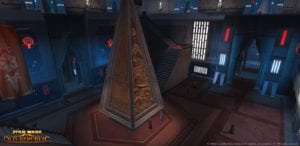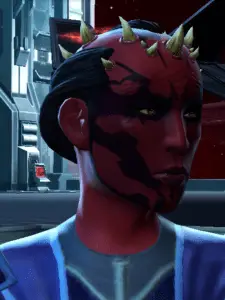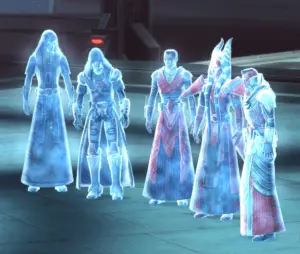Minor spoilers for the Sith Inquisitor class quest chain; minor spoilers for the Knights of the Fallen Empire/Eternal Throne DLCs
It is a great part of RPG experience, and even a greater part of RPG enjoyment, to like your character. And by “RPG” I mean any RPG whatsoever, from LARP to tabletop to video game. Which is only natural, as you can’t really relate to the character you don’t like. And what is RPG if not relating to a character so that you can share its fictional experience?
Which, mind you, doesn’t mean that person should be likable. More like, they should be interesting. An interesting piece of shit, after all, has a much bigger chance to win over your emotions than a bland, shallow Stainless Hero. Like, when you watch The Thief and The Cobbler (the recobbled cut, of course, not that abomination), you sympathize with the first much more than the latter. What a perfect role model he is! But I digress.
When I first set out to play Star Wars: The Old Republic, I was highly unsure if I really wanted to do so. I’ve always had problems with video games in the sense that they don’t actually let you create your character. You get a not-so-wide variety of characters and must choose one to try to empathize with. This makes every game a hit-or-miss case for me: either it’s love at the first sight, or it’s “who are those people and why should I have anything to do with them.”

Meeting the Sith Inquisitor
I confess, I made my initial character choice based on my desire to shoot lightning. I thought it would compensate for the lack of emotional involvement I expected. Luckily, I was mistaken!
The story was captivating right from the start because it had questions to ask. And those questions were directed to me, a player. It was me who had to answer them for myself. It was me who had to choose for myself. Because my course of action depended not on what were my plot goals and neither on my gameplay preferences. It depended on my opinion on certain problems.
Basically, you start in a very unprivileged position, that of a slave. An alien slave, if you really want to experience this story in its full power. You finish in a rather privileged position, that of a Dark Council member. On the surface this seems like a typical rags-to-riches story. However, the action/adventure story is only a minor part of the experience. The main part is the inner path—looking back to your past to create your own future and, more importantly, your future self.
In a nutshell, it is a story exploring how you deal with the trauma from past abuse: do you internalize the point of view of the abuser or the abused? As a survivor myself, I can only praise the way this narrative was given and framed in-game.
Dealing with the Trauma
So, you are a slave. You spend half your Prologue experiencing constant verbal and physical abuse from your sort-of teacher. He wants to get rid of you so that a free, Sith Pureblood candidate will win the golden ticket. But justice is served, and the ticket is finally yours. You are no more a slave, but a Sith—a person in the position of power above all non-Sith. What do you do now? And more importantly, how do you do it?
The game has a Light/Dark Side system in it. Before it was totally remade (broken, I’d rather say) it worked like Paragon/Renegade system in Mass Effect games: you choose one of two alternatives, you get certain amount of Side points, you become more attuned with a certain side of the Force. Or sometimes there is a neutral way, that’s neither. It doesn’t give you any points, but still is important in this storyline.
Your first encounter with Dark vs. Light presents a very typical kill the baby/save the baby dilemma: you can torture a witness to extract the criminal’s name, or you can talk to him and exchange help for information. A very easy choice, is it not? The next encounter is the one that gets under your skin.
It is with the evil mentor who wanted to kill you, who humiliated you, who was your abuser. You can scorn him now that you are free and a Sith in service of a Lord far above your former teacher’s station. You have every reason to hate this man, you have to wish to humiliate him in return. The first option is to threaten him, and while taking it would be extremely understandable, it is not a neutral option–it’s Dark Side. It is still playing along the rules of the system: might is right; you now have both, he has neither.
The Light Side option is to thank him, to break those unholy rules. You may not forget it, and you may be quite bitter later on about your early experience. You may never actually forgive him. Yet you refuse petty revenge, you refuse the power play. Because evil can’t mend or undo another evil.
I swear, something in my heart trembled when that rat of a man smiled to my character in return and thanked him. Because at last I saw the real Dark vs Light narrative, where Light begets more light–and Dark begets more dark.
Thus I understood that I really want to experience that story up to the end.

Your Choices
While both versions of the Sith Inquisitor’s class story present him dealing with his trauma, I could never get myself to try the Dark one. It was really, really dark; the story of a person broken and driven to the edges of sanity, who would never let anyone have anything that person was once denied. I really couldn’t help pity the creature that person would eventually become. It’s not that this story is exactly bad, but I think it is somewhat toxic and too much in line with “being tortured makes you evil” narrative. Not exactly the trope that is in any way helpful for abuse survivors.
The Neutral path—what you tread if you don’t follow any consistent course of action—was less devastating on the personal level. It is more of a quest for identit-y than anything else. Your character does eventually give in to the darker side of their nature, but also eventually does something truly and genuinely good and selfless. In the end they receive the name Occulus, for being a mystery to everyone , including themselves. Because they really don’t know themselves. After all, the Sith Inquisitor is presumed to be very young; somewhere in their early twenties.

I really loved the third option, the Light Side. It is a path of empathy, a path of true freedom. It is also the path most difficult both for your character and for you as a player, for it consciously sets you against certain old tropes and easy decisions.
Good Is Not Easy
Many games try to “convince” you to do right thing by making good choices less hard than bad ones. In general, this game is no exception; if you were to take the Dark route as a Jedi Knight, it would require more time and work from you than the opposite. But on this route it’s the other way around. Being a good person here is not—just as in real life—easy. It is hard.
I can’t describe Light!Sith Inquisitor as anything but a Suffering Empath. Having experienced much trauma in the past, this Sith Inquisitor struggles their best to shield others from the same trauma, even when it doesn’t benefit themselves. Even when it means direct harm to themselves.
For example, their power is based on that of the restless spirits they’ve bound to their soul. Letting those spirits go means the Sith Inquisitor goes back to the start, where they are fairly ordinary a Sith and no match for the truly mighty ones. It means a real threat to their life or, at the very least, their well-being. But because it is right, they fulfill their promise and let the spirits go and find peace.
In another instance, they encounter a racist, foul-mouthed, self-infatuated prick, and they don’t kill him. They choose this because that abominable creature is someone else’s loved person. and your own (both player’s and character’s) desire to punish him cannot be given a higher priority than someone else’s love and anxiety.
This route is hard, because it requires additional quests and lines of dialogue. It is hard, because sometimes you really want to teach someone the hard way, to vent your own (player’s) disgust and rage, to punish the bad guys. But as long as you remember the “two wrongs don’t make right” rule, you can really enjoy that story.
Well, “enjoy” is not exactly the right word, but you get it.

True Freedom
This story is about real freedom; that is, spiritual freedom.
One of the easiest paths to achieve your goals in Star Wars universe is by using Mind Trick. You simply make the other person do and think what you wish them to. It is often used as, well, an easy and harmless workaround. It is often marked as a Light Side option in the Jedi class stories (the Dark option being to fight).
But on this route it is never a offer as a good option—usually neutral, but sometimes even bad. Because, y’know, it’s about freedom. What is more abusive, after all, than to deny a person that person’s free will?
I cannot fathom an action more free of will, of an agency more openly expressed, than denying a whole system of oppression while being raised as a part of it. But the Sith Inquisitor does just that.
Every time they eschew their own in favor of someone else’s, they deny that system. Every time they refuse to acquire more power because it would others more dearly, they deny that system. Every time they choose to respect the free will of the others, even if it means problems for themselves, they deny that system.
Conclusion
What I really wanted to do, right from the beginning, was to thank the author.
Rebecca Harwick created a fascinating story that works perfectly for a genre that requires deep emotional connection with your character. RPG is about living other lives, those we can never experience IRL but those still having an impact on us and our life. We all know that stories matter, and I think we need more stories like that.
And it is a highly satisfying story. You really feel it by the end, that peace and glory that come with being righteous.
Personally, it helped me deal with my own trauma and helped me sort out things and realize that some options are not really an option—that giving in to the abuser’s point of view would really keep me stuck in that trauma forever.
That, while trying to be a good person is often hard, it’s worth it.
P.S.: And Then They Ruined It…
When you experience something that great, you want more of it, do you? Well, I wanted. So I went on to playing DLCs that are supposed to cover the later life of the same hero.
Sadly, the story-line there was clearly written as a continuation of the Jedi Knight’s class story, and any difference in dialogue was purely cosmetic. This actually came out bad for many classes, but the Sith Inquisitor suffers not only plot-and-logic-wise, but also thematically and, I daresay, problematically.
You see, it is generally okay if a privileged golden boy of a Jedi, who was always treated as someone special and a Chosen One, gets a lecture from those still above him about him not being special and his real role being a mere gear in a much greater machine. It serves him right and it even has some thematic significance. I am, of course, referring to the Jedi Knight—the supposed Anakin-done-right hero, the most obviously coded as male and most irritatingly problematic in and of himself.
This kind of lecture is certainly not okay when delivered by two uber-privileged guys (a Jedi Grandmaster and a Head of the Dark Council) to a former slave. They tell this slave to be nothing more than a cogwheel, that freedom is overrated and that they need to subjugate themselves to someone or something greater. They directly say, “you are weak because you fight for your freedom, become a willing slave (to the Force, but still) and you’ll be strong.”
It is problematic, isn’t it?
It really ruined the thing for me. The narrative that was centered around freedom, around acquiring it, understanding it and using it right…it was thrown away in favor of a rather lazy “we all are slaves of the Fate” plot device. And that’s only when we talk themes and not slavery per se, and the narrative completely forgetting about it.
My only solace is, it was written by another person.

